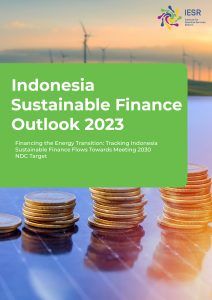Report Launch and Discussion: Indonesia Sustainable Finance Outlook 2023
Recording Playback
The latest IPCC WG1 report stated that the earth’s average temperature increase had reached 1.1 0C. The carbon budget to limit temperature rise to below 1.5 0C is only 500 Gt CO2 (50% probability), which will be exhausted in the next decade if current GHG emission levels (around 48.9 Gt CO2 per year) are maintained. The increase in the earth’s average temperature will impact Indonesia’s economic growth in the future and can reduce Indonesia’s GDP by 17-40% in 2048 (if the increase in the earth’s average temperature reaches 2.00 C and 3.20C). Therefore, decarbonization efforts to limit the increase in the earth’s average temperature below 1.50C are the only option for the world and Indonesia to ensure sustainable economic growth.
Funding is one of the issues faced by many developing countries, where they must continue to develop but on the other hand, they are asked to reduce their emissions, and Indonesia is no exception. Indonesia needs at least IDR 3,779 trillion cumulatively from 2020-2030 or IDR 343.6 trillion annually for mitigation actions in achieving the NDC target in 2030. Meanwhile, the government only allocates around 4.1% of the State Revenue and Expenditure Budget (APBN) or around Rp. 112.74 trillion to address climate change, both mitigation, and adaptation. The existence of financial constraints from the government is a challenge for Indonesia to find other innovative funding sources to encourage a green transition.
In line with this, Indonesia’s financial, banking, and business sectors have begun to consider sustainability aspects in their business processes. In support of a comprehensive sustainable finance policy, the Financial Services Authority (OJK) has issued a Phase II Sustainable Finance Roadmap by guiding the financial services industry under the authority of OJK and referrals to Ministries/Agencies to develop financing initiatives in green and sustainability projects. In addition, the increasing tendency of foreign investors to invest in the green sector is an opportunity for Indonesia to develop a green economy.
The involvement of the financial sector, private sector, philanthropy, and multilateral institutions in meeting climate finance targets is critical in achieving climate finance targets, for example, by developing blended finance mechanisms like the Indonesia Energy Transition Mechanism (ETM) Country Platform as well as existing blended finance mechanisms like the SDG Indonesia One platform. Indonesia has issued several green financing instruments, including green bonds and green sukuk. In addition, the determination of a carbon pricing policy consists of the carbon tax and carbon trading as a mechanism to obtain funding sources that can be channeled to encourage efforts in the field of climate change, as well as to help shape the awareness of business actors about the emissions they produce.
Indonesia received a mandate for the first time as the G20 presidency, a group of several countries that contribute to 80% of the global economy and are responsible for 70% of greenhouse gas emissions. Sustainable finance has become the priority issue in tackling climate change and addressing the risk of a low-carbon transition under the Sustainable Finance Working Group (SFWG) through the finance track. As the holder of the presidential mandate, Indonesia has the opportunity to improve and encourage sustainable finance practices through the SFWG to support the achievement of the Paris Agreement.
This year the Institute for Essential Services Reform (IESR) will launch a study, Indonesia Sustainable Finance Outlook (ISFO) 2023, through a discussion aimed to gain views and perceptions from policymakers and business actors on trends that will occur in the coming year in green projects. This event will focus on Indonesia’s sustainable finance framework and lessons learned in 2022 to address the challenges driving the energy transition in 2023.
Introduction of Indonesia Sustainable Finance Outlook
Indonesia Sustainable Finance Outlook (ISFO) is the new series as part of IESR flagship report since 2018, Indonesia Energy Transition Outlook (IETO), previously Indonesia Clean Energy Outlook (ICEO), which discusses in detail comprehensive sustainable financial status. The first edition of ISFO collects various perspectives from stakeholders and curates them with in-depth studies to deliver strategic analysis of how the energy transition to a green economy in the country through the support of sustainable funding. ISFO also includes a report on the development of sustainable finance issues at the G20 as one of the momentums for Indonesia’s current presidency.
Objective
- To inform and introduce one of the latest IESR flagship reports, Indonesia Sustainable Finance Outlook (ISFO);
- Reviewing the evaluation and readiness of sustainable finance in Indonesia, particularly in the energy and climate sector, with policymakers and stakeholders;
- Conduct a review and evaluation of the development of sustainable policies in Indonesia during 2022 in the context of the impact of government policies and regulations issued on relevant stakeholders, as well as their views for 2023;
- Obtain information related to developments in sustainable finance at the G20 and global levels related to funding in the clean energy sector and climate.
Related Publication
Presentation Materials
Ichsan Hafi – ISFO 2023 Main Author, IESR
Presentation-ISFO-2023-Launching


